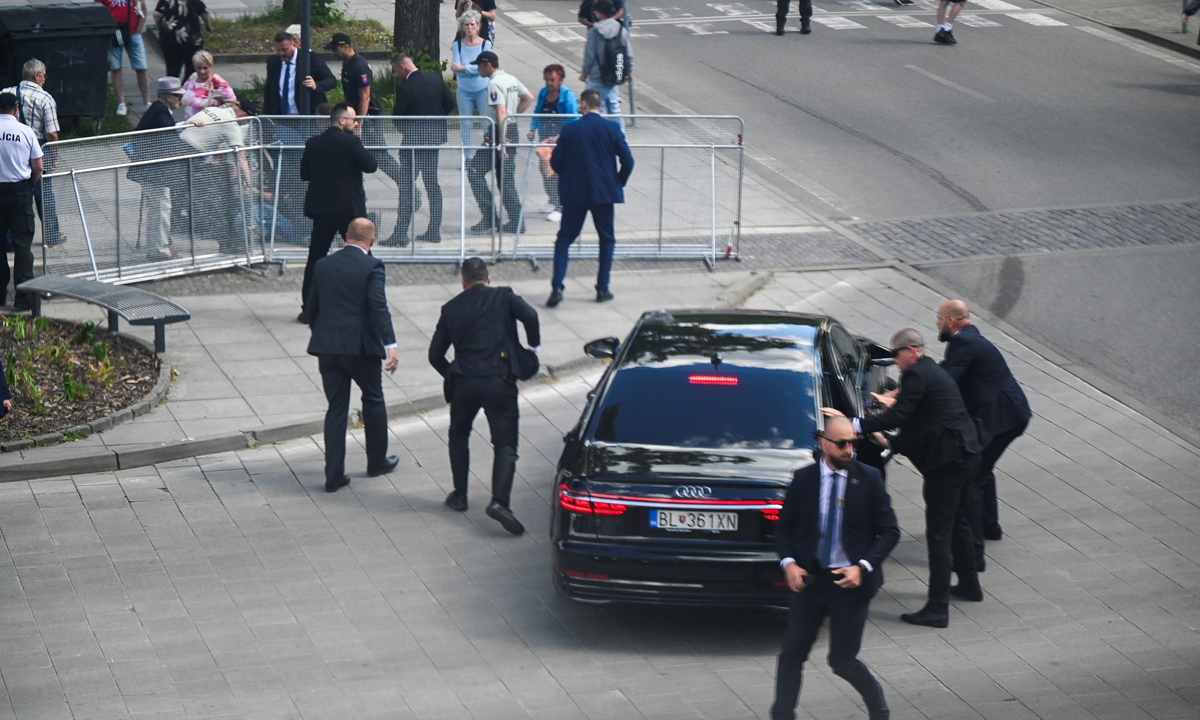
Bodyguards and security staff act to bring wounded Slovak Prime Minister Robert Fico to a car after he was shot after a cabinet meeting in Handlova, Slovakia on May 15, 2024. The suspect has been detained and Fico is in stable condition as of press time, according to media reports. Photo: IC
China on Thursday strongly condemned the violent attack on Slovakia's Prime Minister Robert Fico, saying that it is deeply shocked by the incident. China also extended its sincere condolences to Slovakia and Fico's family.
The rest of the world was also shocked by the shooting of Fico. Some Chinese experts said this incident showed that the current state of unrest in Europe is intensifying, highlighting the increasing internal divisions within European society that are exacerbating political fragmentation.
Fico was shot multiple times and gravely wounded on Wednesday. His deputy prime minister said he believed Fico would survive, the Associated Press (AP) reported on Thursday.
Five shots were fired outside a cultural center in the town of Handlova, nearly 140 kilometers northeast of the country's capital Bratislava. Fico was shot while attending a meeting of his government, the AP said.
Slovakian media outlets have identified the shooter as 71-year-old Juraj Cintula, a self-described writer who previously worked as a security guard, France-based Euronews said.
"China is deeply shocked by the attack on Slovakian Prime Minister Robert Fico and extends sincere sympathies to him and his family. China strongly condemns the violent attack," Chinese Foreign Ministry spokesperson Wang Wenbin said at a routine press conference on Thursday.
Some Western media focused on Fico's ties to Russian President Vladimir Putin and to Prime Minister Viktor Orban of Hungary. Some also described him as a "populist, burly and brash political veteran." Fico has previously opposed EU sanctions on Russia and has been against Ukraine joining NATO, according to media reports.
Matúš Šutaj-Eštok, Slovakia's interior minister, was quoted as saying in a report by the Guardian that initial information "clearly points to a political motivation" after Slovakia's presidential election.
"The investigation into this incident is still ongoing, and there is no clear conclusion yet. But everyone is speculating that it might be related to Fico's pro-Russian stance, or more accurately, his neutral position in the Russia-Ukraine conflict," Cui Heng, a scholar from the Shanghai-based China National Institute for SCO International Exchange and Judicial Cooperation, told the Global Times on Thursday.
"Many people are likely dissatisfied with his stance," Cui said. If the final investigation proves that Fico was attacked because of his neutral position in the Russia-Ukraine conflict, thus angering some people, it would reflect the fact that the Russia-Ukraine conflict has reached a very tense stage in which unconventional methods are being used, Cui noted.
Assassination attempts on political figures in Europe have been rare in recent years. However, due to a rise in such extreme actions, influenced by internal and external crises, the political and social landscape across Europe is showing signs of radicalization, with individuals on both sides of the political spectrum becoming increasingly extreme in their actions, experts said.
"In Slovakia, the attack on a political figure is a particularly severe incident, but it is not isolated. Germany has also experienced attacks on politicians, where individuals have resorted to extreme measures to express their political demands," Dong Yifan, an associate research fellow at China Institutes of Contemporary International Relations, told the Global Times on Thursday.
"This trend toward radical behavior may be on the rise in Europe, especially with the European Parliament elections taking place this year," Dong said.
German media outlet Deutsche Welle reported in early May that anyone involved in politics in Germany is living an increasingly dangerous life. It describes the recent attack on Social Democrat Matthias Ecke as "just the tip of the iceberg: local politicians, in particular, are being attacked, threatened and insulted on a daily basis."
"The current state of unrest in Europe and the West is undoubtedly intensifying. There are increasing street protests and general social instability, exemplified by incidents like the attack on Fico," Cui Hongjian, a professor with the Academy of Regional and Global Governance with Beijing Foreign Studies University, told the Global Times on Thursday.
These widespread disturbances and security concerns reflect a broader rise in societal insecurity and internal conflicts within countries, Cui Hongjian noted.
However, Cui Hongjian believed that the reason behind the attack on Fico might be more complex than it initially appeared, as he is a controversial figure. "Fico has served as prime minister four times, and his tenure has been marred by allegations of corruption."
Experts also warned that addressing and preventing such incidents, as well as tackling their root causes, pose a significant challenge for Europe, and the possibility of more extreme incidents cannot be ruled out in the future.
"Currently, the true motive of the attacker cannot be confirmed. If this attack is seen as having political motives, it would also reflect the extremely tense political atmosphere in Europe," Cui Heng said.
The tense and antagonistic state between different factions is reminiscent of the pre-World War I era, when leaders frequently faced assassination attempts. "The Sarajevo incident triggered a chain reaction among major powers, and we still need to observe the consequential developments of the assassination attempt against Fico, particularly the actions of major powers," Cui Heng said.




